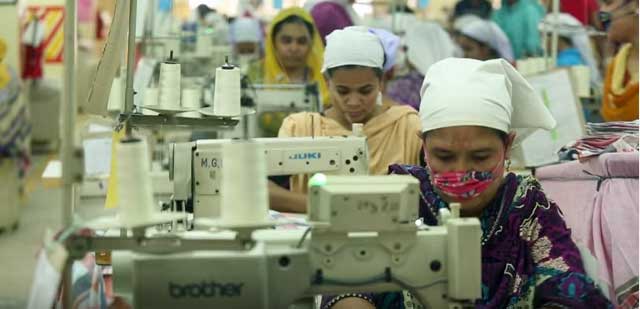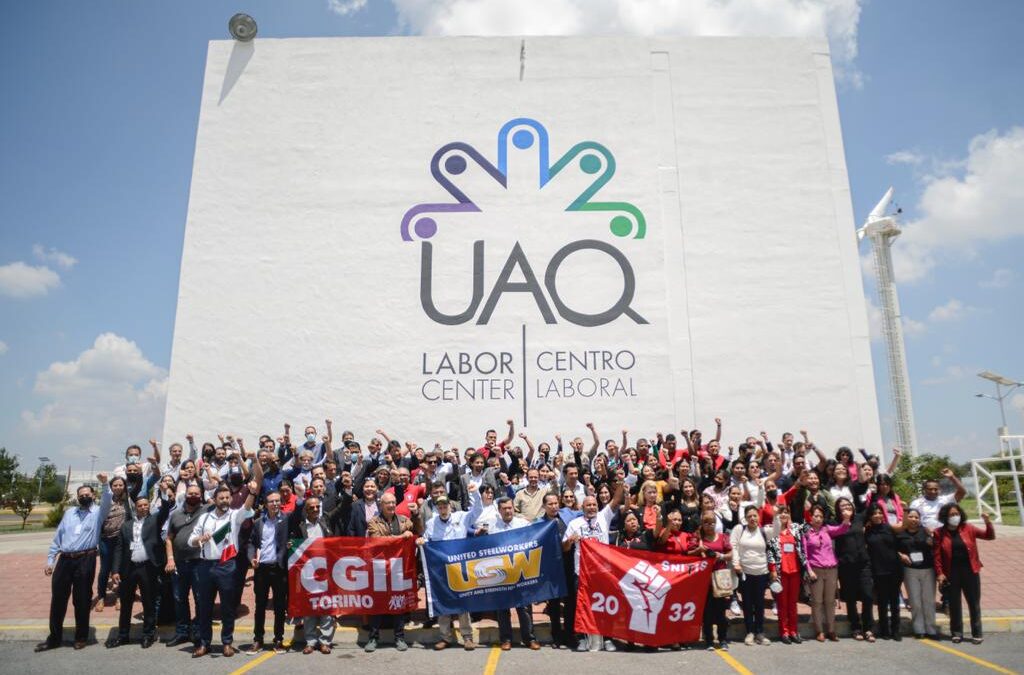
Aug 20, 2024
With the unexpected shift in Bangladesh political leadership, garment workers say they are hopeful but cautious about the effect on their wages, working conditions and fundamental civil rights, such as the freedom to form unions.
“We hope something positive will happen. However, after the fall of the government, some factories … were prevented from opening in some places,” one factory-level union representative* told the Solidarity Center. “It should not happen.”
After weeks of peaceful student protest were met with deadly government suppression, long-term Prime Minister Sheikh Hasina was forced to flee the country on August 4. Students were rallying against a government jobs quota system granting coveted decent work opportunities to family veterans of the 1971 Bangladesh war for independence. More than 600 protestors have been killed.
The economy of Bangladesh, the world’s second-largest garment exporter, depends on garment factories, but producers say customers are concerned about violence and disruption. In 2023, 4 million garment workers contributed 85 percent of Bangladesh’s $55 billion in annual exports.
The recent disruptions, including a government internet shutdown, closed factories, but some garment workers were back to work August 7.
“We only wish our garment sector to thrive,” another worker said. “Our hope is all the factories remain open.”
Lack of Union Freedom Represses Decent Wages, Work
Government repression against workers seeking to form and join unions has prevented garment workers from achieving the living wages and safe working conditions they have sought to achieve, workers say.
With a new government, garment workers seek a crucial change: The ability to freely exert their internationally recognized freedom to form independent unions and bargain collectively for wages and working conditions.
“We want to be able to exercise our trade union rights to the fullest with no pressure from anybody,” says one union leader, who has received threats for efforts to stand up for worker rights.
Although most factories have resumed production, garment workers say their monthly wage still must be increased.
“Many families live on the income of garment workers,” said the union representative.
While many garment workers received wages in July, union leaders tell Solidarity Center that in many other factories, especially those without unions, workers were not paid. In Gazipur, ready-made garments and textile factories demanded their due payment.
Last fall, garment workers who held protests for higher wages were also brutally repressed. The government raised wages to $113 a month, an amount union leaders say does not cover the cost of living, and about half of what workers sought. Multiple labor organizations, including the Industrial Bangladesh Council and Garments Sramik Parishad, said garment workers’ monthly minimum wage must be at least Tk 23,000 a month ($195.81).
Workers said last year’s wage revision did not cover basic needs as “the prices of daily commodities have skyrocketed.” One garment worker who has been on the job for 15 years said, “Usually, our wage is revised every five years. We expect the new government to do that in three years. It will be really beneficial for garment workers.”
* All workers interviewed for this story asked to remain anonymous.

Jul 26, 2024
More than 500 Philippine workers and trade unionists joined a march on July 22nd in Quezon City, demanding that President Ferdinand R. Marcos, Jr. declare support in his State of the Nation Address (SONA) for legislation that would further raise the minimum wage.
The Regional Tripartite Wages and Productivity Board approved a 35 PHP (approximately 0.60 US dollar) daily minimum wage hike for workers in the capital region earlier this month. This falls far short of the 150 PHP (about 3 US dollars) wage hike the National Wage Coalition has persistently called for to support workers’ economic recovery amid high inflation, poor job quality and a lack of new and decent jobs.
The Coalition, representing local workers across various industries and sectors, has remained steadfast in demanding livable wages and are advocating for multiple bills that have been introduced but still await action from the government.
The president has yet to engage in dialogue with Philippine Labor representatives and did not mention wages in his SONA.
Coalition member, Center of United and Progressive Workers (SENTRO), noted in an online statement, “[t]he [national government’s] absence of genuine effort to attain long-term solutions against rising costs and the provision of measly increases that leave workers running in place against inflation…” SENTRO added, “We deserve higher wages not simply because of our labor, but because we are human beings who have every right to live peacefully and decently.”

Sep 2, 2022
A new Labor Center in Mexico will advise workers about their rights and how to mobilize and organize unions and collectively bargain. The Labor Center, at the Autonomous University of Querétaro in central Mexico, is supported by the Solidarity Center and the UCLA Labor Center.
“The aim is to strengthen and promote the full recognition of labor rights, freedom of association and organization, and the democratic participation of workers through research, linkage and accompaniment,” said Labor Center Director Dr. Javier Salinas García. Salinas spoke at a recent Solidarity Center event in Mexico to announce the opening.
The Labor Center comes three years after Mexico’s government announced a series of comprehensive labor reforms to establish a democratic unionization process, address corruption in the labor adjudication system and eradicate employer protection (“charro”) unions prevalent in the country.
The Labor Center is “a way to respond to the needs of the situation,” said Beatriz García, Solidarity Center Mexico deputy program director.
“I think we all agree that Mexico is going through a historic moment. The labor reform responds to the demands that have been the objectives of the struggle of many workers for years, for decades, and reflects some positive practices of the independent unions,” she said.
The event featured a panel of independent union members and leaders who discussed the future of the labor movement in Mexico in the wake of historic labor law reforms.
Panelists explored the role that democratic and independent trade unions in promoting labor reform implementation in Mexico three years after the 2019 Labor Reform and negotiations of the United States–Mexico–Canada Agreement (UMSCA/T-MEC).
Speakers shared how they are using the tools of labor reform to organize on their worksites.
“We are the delegates, and we call our colleagues to share information about the Union League,” said Sonia Cristina García Bernal. “We have helped colleagues who were told they were going to be fired without severance pay. We have been able to get them severance pay. We have been able to get them rehired.”
“After these three years, the tool that we use the most is fast response mechanisms,” said Imelda Guadalupe Jiménez Méndez. “This has been a very important tool.”
In addition to Beatriz García, speakers included: Imelda Guadalupe Jiménez Méndez, Secretary for Political Affairs, the Miners Union (Los Mineros); Julieta Mónica Morales, General Secretary, Mexican Workers’ Union League (Liga Obrera Mexicana); Rita Guadalupe Lozano Tristán, Mexican Workers’ Union League (Liga Obrera Mexicana); Alejandra Morales, General Secretary, Independent Union of National Workers in the Automotive Industry; and Sonia Cristina García Bernal, Special Delegate, Mexican Workers’ Union League (Liga Obrera Mexicana).



